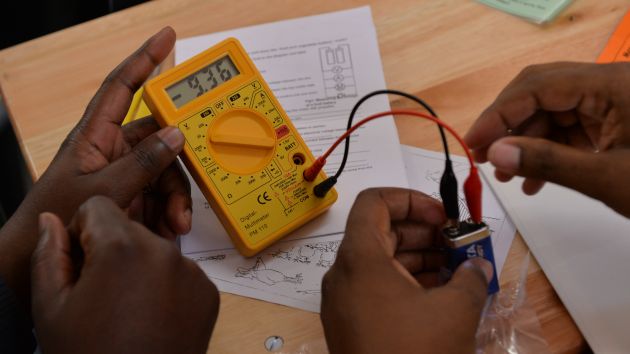How does an Experimento workshop in South Africa’s Gauteng Province differ from an Experimento workshop in Western Cape Province? What have the multipliers learned themselves in the course of sharing their knowledge with teachers at area schools? Do certain elements of the program content have a particular power to convince and motivate? The first Experimento progress review workshop held from February 13-15, 2015, brought almost 20 Experimento multipliers from the Provinces of Gauteng, KwaZulu Natal, Eastern Cape and Western Cape to Cape Town to discuss a wide range of stimulating questions, share details of their experiences and help to create an inter-provincial network.
South Africa was among the initial group of countries and regions approached when Siemens Stiftung launched its Experimento international educational program, with the pilot phases for the Experimento I 4+ preschool module and Experimento I 10+ secondary-school module starting in the fall of 2011. Experimento I 8+ for children in the eight to twelve age range has also subsequently been introduced in a version adapted to reflect local educational requirements. The content of the program is shared and disseminated through special Science Competence Centers (SCC) located in Johannesburg, Cape Town, Durban and Mthatha. Around 270 teachers, 105 students and 20,370 children and young people at school now work with the Experimento international educational program.
A forum for learning, encounters and participation
The successful establishment and development of Experimento in South Africa has produced a wealth of valuable experiences as well as strengthening the local educational agenda. The three-day workshop provided the committed multipliers in attendance with an excellent opportunity to talk, reflect together, share insights and learn from one another, not least by exploring the features common to their work and the differences that exist. Many of these differences can be explained by differing educational circumstances, but socioeconomic factors certainly also play a role. The principal challenges facing teachers in Mthatha, Eastern Cape, for example, involve class sizes that often reach 60 or more, poorly equipped schools and a lack of sufficient methodological training. In Cape Town, Western Cape, in contrast, high levels of immigration from other African countries pose the greatest challenge: bringing all the many diverse cultures together and managing with the various different languages spoken demands high levels of personal commitment from teachers and strong organizational skills in lesson planning.
An autonomous network of commitment practitioners
The ambitious workshop program allowed scope for participants not only to discuss and share views on the current state of play, but also to look at further refining potential approaches to using Experimento and address questions such as what we can do better and where we will be with the program in five years’ time. As the nature of these fundamental questions shows, the Experimento journey in South Africa still has a long way to go – although the focus is certainly shifting: it became very clear as the workshop progressed that the opportunity to discuss issues constructively and share knowledge and experience between provinces was enormously beneficial for the participants and it has been decided that this type of collaborative approach will be continued and encouraged in future. The main focus, however, will remain on individuals preparing and delivering much more of what the program has to offer independently on their own initiative. “This workshop has shown just how well Experimento has been accepted as a natural component of the educational proposition and how effectively it is being implemented – and that’s obviously something of which we are very proud! Ultimately our mission at Siemens Stiftung is to set the ball rolling, to initiate programs that are then successfully taken forward. Thanks to our committed local partners on the ground, the Experimento program is well on the way to meeting this objective in South Africa,” explains Rebecca Ottmann, Program Manager for Experimento in Africa, at the conclusion of an intensive but thoroughly successful workshop.



